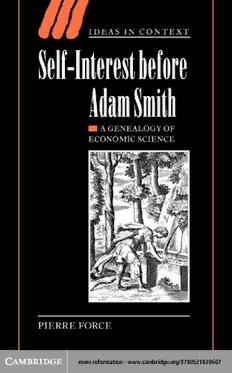
Self-interest before Adam Smith: a genealogy of economic science PDF
Preview Self-interest before Adam Smith: a genealogy of economic science
This page intentionally left blank SELF-INTEREST BEFORE ADAM SMITH AGenealogyofEconomicScience Self-Interest before Adam Smith inquires into the foundations of economictheory.Itisgenerallyassumedthatthebirthofmoderneco- nomicscience,markedbythepublicationofTheWealthofNationsin 1776,wasthetriumphofthe“selfishhypothesis”(theideathatself- interestisthemotiveofhumanaction).Yet,asaneo-Epicureanidea, this hypothesis had been a matter of controversy for over a century andSmithopposeditfromaneo-Stoicpointofview.Buthowcanthe Epicureanprinciplesoforthodoxeconomictheorybereconciledwith theStoicprinciplesofAdamSmith’sphilosophy?PierreForceshows howSmith’stheoryrefutesthe“selfishhypothesis”andintegratesitat thesametime.HealsoexplainshowSmithappropriatedRousseau’s “republican” critique of modern commercial society, and makes the casethattheautonomyofeconomicscienceisanunintendedconse- quence of Smith’s “republican” principles. This book sheds light on someclassicpuzzlesofeconomictheoryandisamajorworkfroman outstandingscholar. pierre force, NellandHerbertM.SingerProfessorofContem- porary Civilization and Professor of French at Columbia University inNewYork,istheauthorofLeProbl`emeherm´eneutiquechezPascal (1989)andMoli`ereouLePrixdeschoses(1994). ideas in context EditedbyQuentinSkinner(GeneralEditor),LorraineDaston, DorothyRossandJamesTully Thebooksinthisserieswilldiscusstheemergenceofintellectualtraditionsandof relatednewdisciplines.Theprocedures,aimsandvocabulariesthatweregenerated will be set in the context of the alternatives available within the contemporary frameworksofideasandinstitutions.Throughdetailedstudiesoftheevolutionof suchtraditions, andtheirmodificationby differentaudiences,it ishopedthata newpicturewillformofthedevelopmentofideasintheirconcretecontexts.By thismeans,artificialdistinctionsbetweenthehistoryofphilosophy,ofthevarious sciences,ofsocietyandpolitics,andofliteraturemaybeseentodissolve. TheseriesispublishedwiththesupportoftheExxonFoundation. Alistofbooksintheserieswillbefoundattheendofthevolume. SELF-INTEREST BEFORE ADAM SMITH A Genealogy of Economic Science PIERRE FORCE ColumbiaUniversity Cambridge, New York, Melbourne, Madrid, Cape Town, Singapore, São Paulo Cambridge University Press The Edinburgh Building, Cambridge , United Kingdom Published in the United States of America by Cambridge University Press, New York www.cambridge.org Information on this title: www.cambridge.org/9780521830607 © Pierre Force 2003 This book is in copyright. Subject to statutory exception and to the provision of relevant collective licensing agreements, no reproduction of any part may take place without the written permission of Cambridge University Press. First published in print format 2003 - isbn-13 978-0-511-06291-9 eBook (NetLibrary) - isbn-10 0-511-06291-5 eBook (NetLibrary) - isbn-13 978-0-521-83060-7 hardback - isbn-10 0-521-83060-5 hardback Cambridge University Press has no responsibility for the persistence or accuracy of s for external or third-party internet websites referred to in this book, and does not guarantee that any content on such websites is, or will remain, accurate or appropriate. Contents Acknowledgments pageviii Introduction 1 1 Self-interestasafirstprinciple 7 2 Epicureanvs.Stoicschemes 48 3 Self-interestandreason 91 4 Passions,interests,andsociety 135 5 Interestedanddisinterestedcommerce 169 6 Self-interestandthepublicgood 205 Conclusion 256 Bibliography 264 Index 276 vii Acknowledgments The topic of this book has been with me for a long time. I first touched upon it in a 1989 article.1 It was in the background of my 1994 book on Molie`re.2ThecolloquiumIorganizedattheMaisonFranc¸aiseofColumbia Universityin1994wasdedicatedingreatparttotheseissues.3 Someofthe arguments developed in chapter 1 were presented in a Yale French Studies articlein1997.4 Manyoftheideaspresentinthisbookweretestedinthe seminarItaughtin1996,“TheCommerceoftheSelffromMontaigneto Adam Smith,” and in the seminar I co-taught with Allan Silver in 2000, “Self-InterestbeforeCapitalisminLiteratureandSocialTheory.”Theques- tionsandcommentsfromstudentsintheseseminarsgreatlyhelpedmeto clarifymythinking.ThisworkowesalottothemanyconversationsIhad with Allan Silver, a colleague who is also a true friend. I thank another friend, Kathy Eden, for helping me find my way in the complete works of Augustine. Thanks are also due to Charles Larmore for several useful suggestions, and to Knud Haakonssen for his generous advice on how to navigate the waters of Smith scholarship. I also wish to acknowledge the comments,suggestionsandcriticismsfromcolleaguesandfriendswhoread parts of the manuscript. I had the opportunity to discuss chapter 1 with the members of the Chicago Group on Modern France. Chapter 2 has benefitedfromJeanLafond’sunmatchedexpertiseontheAugustiniantra- dition in the early modern period. Incisive comments by Jon Elster and JohnD.Collinshaveledmetoreformulatesomekeypassagesinchapter3. 1 “WhatIsaManWorth?EthicsandEconomicsinMolie`reandRousseau,”RomanicReview1(1989), pp.18–29. 2 Moli`ereouLePrixdeschoses.Morale,´economieetcom´edie,Paris:Nathan,1994. 3 Delamoralea` l’´economiepolitique.Dialoguefranco-am´ericainsurlesmoralistesfran¸cais,editedby PierreForceandDavidMorgan,introductionbyPierreForce,Pau:Publicationsdel’Universite´de Pau,1996. 4 “Self-Love,Identification,andtheOriginofPoliticalEconomy,”inExploringtheConversibleWorld: TextandSociabilityfromtheClassicalAgetotheEnlightenment,editedbyElenaRusso,YaleFrench Studies92(1997),pp.46–64. viii
